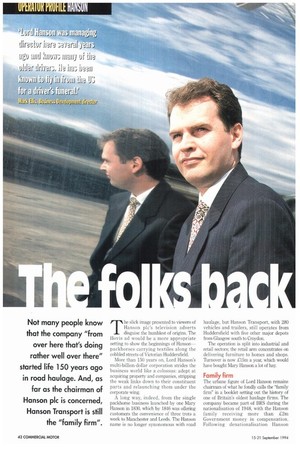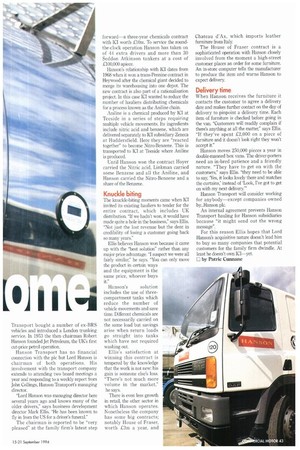T he slick image presented to viewers of Hanson plc's television
Page 44

Page 45

If you've noticed an error in this article please click here to report it so we can fix it.
adverts disguise the humblest of origins. The Hovis ad would be a more appropriate setting to show the.beginnings of Hanson— packhorses carrying textiles along the cobbled streets of Victorian Huddersfield.
More than 150 years on, Lord Hanson's multi-billion-dollar corporation strides the business world like a colossus: adept at acquiring property and companies, stripping the weak links down to their constituent parts and relaunching them under the corporate wing.
A long way, indeed, from the single packhorse business launched by one Mary Hanson in 1830, which by 1846 was offering customers the convenience of three trots a week to Manchester and Leeds. The Hanson name is no longer synonomous with road haulage, but Hanson Transport, with 280 vehicles and trailers, still operates from Huddersfield with five other major depots from Glasgow south to Croydon.
The operation is split into industrial and retail sectors; the retail arm concentrates on delivering furniture to homes and shops. Turnover is now £15m a year, which would have bought Mary Hanson a lot of hay.
Family firm
The urbane figure of Lord Hanson remains chairman of what he fondly calls the "family firm" in a booklet setting out the history of one of Britain's oldest haulage firms. The company became part of BRS during the nationalisation of 1948, with the Hanson family receiving more than 1:2m Government money in compensation. Following denationalisation Hanson Transport bought a number of ex-BRS vehicles and introduced a London trunk ing service. In 1953 the then chairman Robert Hanson founded Jet Petroleum, the UK's first cut-price petrol operation.
Hanson Transport has no financial connection with the plc but Lord Hanson is chairman of both operations. His involvement with the transport company extends to attending two board meetings a year and responding to a weekly report from John Collings, Hanson Transport's managing director.
"Lord Hanson was managing director here several years ago and knows many of the older drivers," says business development director Mark Ellis. "He has been known to fly in from the US for a driver's funeral."
The chairman is reported to be "very pleased" at the family firm's latest step forward—a three-year chemicals contract with ICI worth ,£10m. To service the roundthe-clock operation Hanson has taken on of 44 extra drivers and more than 30 Seddon Atkinson tankers at a cost of £100,000 apiece.
Hanson's relationship with ICI dates from 1968 when it won a trans-Pennine contract in Heywood after the chemical giant decided to merge its warehousing into one depot. The new contract is also part of a rationalisation project. In this case ICI wanted to reduce the number of hauliers distributing chemicals for a process known as the Aniline chain.
Aniline is a chemical produced by ICI at Teeside in a series of steps requiring multiple vehicle movements. Its ingredients include nitric acid and benzene, which are delivered separately to ICI subsidiary Zeneca at Huddersfield. Here they are "reacted together" to become Nitro-Benzene. This is transported to ICI at Teeside where Aniline is produced.
Until Hanson won the contract Hoyer carried the Nitric acid, Linkman carried some Benzene and all the Aniline, and Hanson carried the Nitro-Benzene and a share of the Benzene.
Knuckle biting
The knuckle-biting moments came when ICI invited its existing hauliers to tender for the entire contract, which includes UK distribution. "If we hadn't won, it would have made quite a hole in the business," says Ellis. "Not just the lost revenue but the dent in credibility of losing a customer going back so many years."
Ellis believes Hanson won because it came up with the "best solution" rather than any major price advantage. "I suspect we were all fairly similar," he says. "You can only move the product in certain ways and the equipment is the same price, whoever buys it."
Hanson's solution includes the use of threecompartment tanks which reduce the number of vehicle movements and save time. Different chemicals are not necessarily carried on the same load but savings arise when return loads go straight into tanks which have not required washing out.
Ellis's satisfaction at winning this contract is tempered by the knowledge that the work is not new: his gain is someone else's loss. "There's not much more volume in the market," he says.
There is even less growth in retail, the other sector in which Hanson operates. Nonetheless the company has some big contracts; notably House of Fraser, worth ,C3m a year, and Chateau d'Ax, which imports leather furniture from Italy.
The House of Fraser contract is a sophisticated operation with Hanson closely involved from the moment a high-street customer places an order for some furniture. An in-store computer tells the manufacturer to produce the item and warns Hanson to expect delivery
Delivery time
When Hanson receives the furniture it contacts the customer to agree a delivery date and makes further contact on the day of delivery to pinpoint a delivery time. Each item of furniture is checked before going in the van. "Customers will readily complain if there's anything at all the matter," says Ellis. "If they've spent £2,000 on a piece of furniture and it doesn't look right they won't accept it."
Hanson moves 250,000 pieces a year in double-manned box vans. The driver-porters need an in-bred patience and a friendly nature. "They have to get on with the customers," says Ellis. "they need to be able to say Yes, it looks lovely there and matches the curtains,' instead of 'Look, I've got to get on with my next delivery" Hanson Transport will consider working for anybody—except companies owned by...Hanson plc.
An internal agreement prevents Hanson Transport hauling for Hanson subsidiaries because "it might send out the wrong message".
For this reason Ellis hopes that Lord Hanson's acquisitive nature doesn't lead him to buy so many companies that potential customers for the family firm dwindle. At least he doesn't own ICI—yet.
D by Patric Curmane
































































































